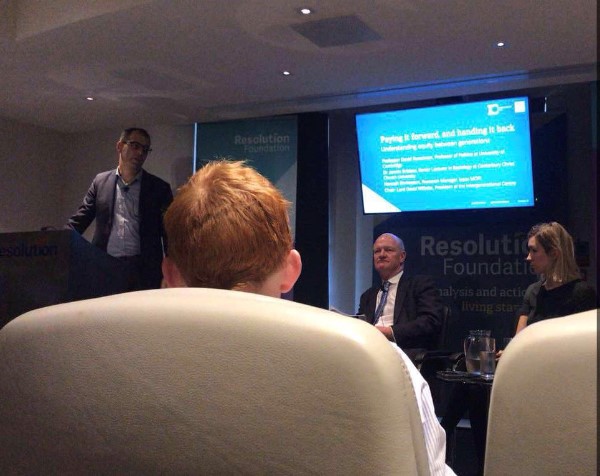Understanding Equity Between Generations
By Alia Khan, Consultant
Studies suggest that 1 in 3 millennials will never be able to own a home, yet 1 in 6 baby boomers presently own a second property. This shifts the paradigm of the social contract and forces questions to arise relating to generational divide in equity and home ownership.
Resolution Foundation hosted a panel of experts to explore the generational gap in equity. It based its discussion around the delivery of the social contract – the belief that each generation should enjoy higher living standards than the ones before them, but in recent years, from earnings to home ownership, progress has somewhat stalled. This has led generational equity to rise in the political agenda, and with this comes the question of housing and whether we forward and transfer over our assets to current and future generations.
Speakers included; Professor David Runciman, Professor of Politics at University of Cambridge, Dr Jennie Bristow, Senior Lecturer in Sociology at Canterbury Christ Church University, and Hannah Shrimpton, Research Manager for Ipsos MORI. The event was chaired by Lord David Willets, President of the Intergenerational Centre.
The panel discussion remained good natured with all speakers and audience members in agreement that younger generations should enjoy better standards of living than the previous, with comparisons drawn between baby boomer and the millennial generations in our present society. The discussion started off with Lord David Willets briefly setting the scene with evidence suggesting how the interest of future generations are valued – with the average life expectancy raising, and how in some ways such issues and discussions around generational equity would work in the self-interest of the current baby boomers and how income is smoothed across generations which relates back to how the social contract works, in all aspects of life such as; education, health and home ownership.
Professor David Runciman started the discussion off by arguing that intergenerational discussions and political conflicts around the world today go back to the idea of young people feeling disadvantaged due to them not feeling properly represented politically – he used the Brexit outcome as evidence to support this notion, he explained how younger people were out-voted by the older generation, simply because not enough younger people had turned up to vote. As a solution to this, he proposed to lower the voting age to 6; he explained this would result in better and fair elections, since more people are voting. He concluded that parliament would be better if it included 100 MPs in their 20s, resulting in improved representation for young people and in some ways bridge the generational gap in equity.
However, Dr Jennie Bristow disagreed with the lowering the voting age to 6. She explained how she does not think the problems of politics and economics are generational, and in respects to intergenerational equity, she expressed her concerns and explained how it is damaging to lead a narrative which shifts the blame of political and economic conflicts as a generational struggle, saying that, ‘the idea comes from the elite and not the young people’. She proposed, instead, for a greater need for adults to understand younger people and to show leadership, adding, ‘adults should grow up and take responsibility’. She argued that economic problems are being posed as generational ones when the reality is far from this. She proposed to work on the issues as economic and political rather than see them as generational issues, concluding that intergenerational equity is not the way forward.
Hannah Shrimpton of Ipsos MORI then presented some of their research findings of public perception on intergenerational equity. Public opinion is broadly in agreement that future generations should live better lives than the previous, however studies in 2017 suggest that currently, only 23% millennials feel they are living better lives compared to 48% who feel they are not living better lives than the previous generation. A stark difference in comparison to studies conducted in 2003 which showed 43% young people felt they lived better lives and only 12% felt they did not. Studies also showed that the main areas of concern for many young people were surrounding the ability to own homes, secure better jobs and good healthcare. The report also found when reflecting the areas of millennials’ lives people are most pessimistic about, those who think young adults will have a worse life than their parents are most likely to point to rising house prices (47 per cent) and a lack of stable employment opportunities (38 per cent) as key drivers. In addition, three-in-ten (30 per cent) of those who are pessimistic cite Brexit as a key reason for millennials’ poorer prospects.
The panel discussion was then followed by a Q&A session, a key theme around housing and trade-off transfers of equity remained within the questions that followed the discussion. One of the audience members pointed out that the reason for a low voter turnout amongst younger people was due to more of these individuals living in private rented accommodations which means it is far more difficult for them to register to vote. The conclusions were started off by Dr Jennie Bristow who suggested that on the issue of housing, the government should abolish the ‘help to buy’ scheme and invest more on building social housing. Hannah Shrimpton based her conclusion on evidence in research, citing that many baby boomers do feel they worked hard in attaining their assets and are deserving of keeping it. she added that when conducting research, even millennials felt that the assets should not just be handed over. Professor David Runciman went back to his point and concluded that a lot of the generational equity relates back to experiences, and politics and economics certainly are a generational issue with housing and equity being at the forefront of this. Lord David Willets contributed to the final conclusion of the panel discussion and made a point in stating that baby boomers have actually paid in far less to the state in taxes than they will be paying out, compared to the current and future generations who are and will be paying in far more than they will be paying out, reiterating his point that a problem of generational equity exists and is very real.

Strategic land and site promotion
“Chelgate gives a real insight into political thinking at all levels and all political persuasions, …

Energy and infrastructure
From new nuclear and unconventional gas to renewables, waste and airports, our team has worked …


